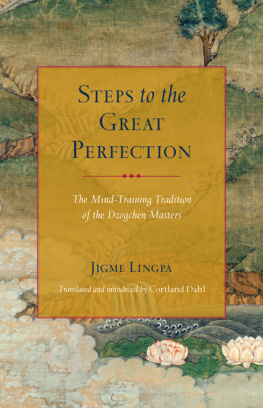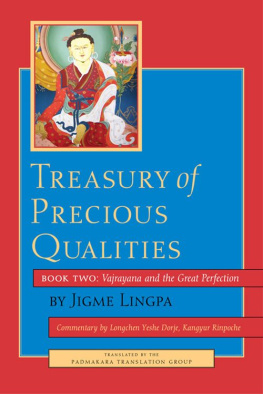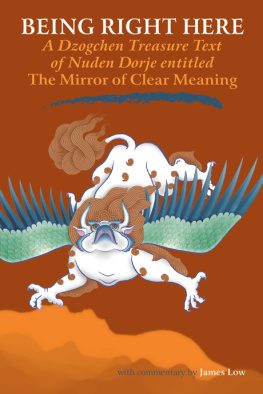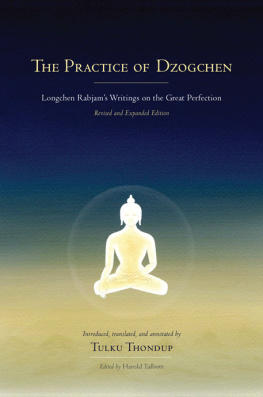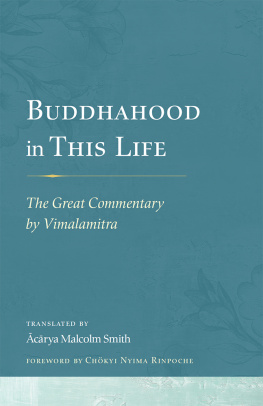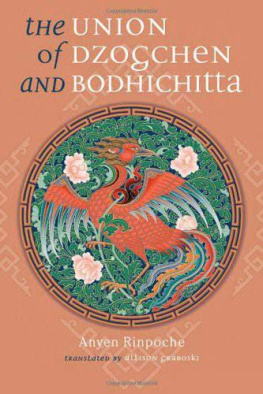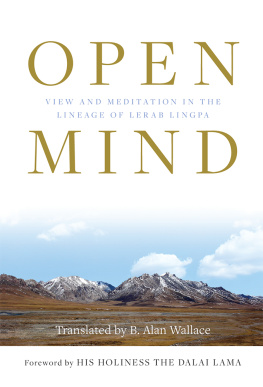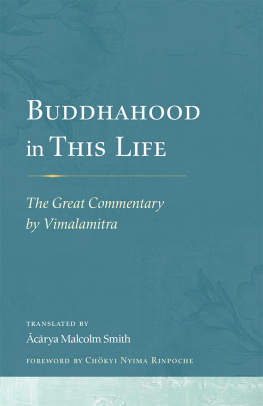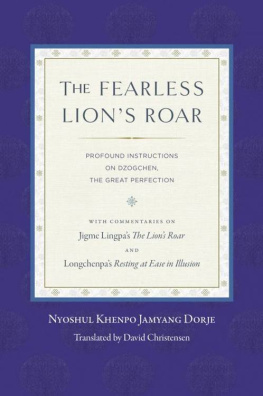Sign up to receive weekly Tibetan Dharma teachings and special offers from Shambhala Publications.

Or visit us online to sign up at shambhala.com/eshambhala.
Steps to the Great Perfection

The Mind-Training Tradition of the Dzogchen Masters
Jigme Lingpa
With contributions by
Garab Dorje and Longchenpa
Translated and introduced by Cortland Dahl
Foreword by Tulku Thondup Rinpoche

SNOW LION
BOULDER
2016
Snow Lion
An imprint of Shambhala Publications, Inc.
4720 Walnut Street
Boulder, Colorado 80301
www.shambhala.com
2016 by Cortland Dahl
Cover art courtesy of the Shelley and Donald Rubin Private Collection
All rights reserved. No part of this book may be reproduced in any form or by any means, electronic or mechanical, including photocopying, recording, or by any information storage and retrieval system, without permission in writing from the publisher.
Library of Congress Cataloging-in-Publication Data
Names: Jigs-med-gling-pa Rang-byung-rdo-rje, 1729 or 17301798, author. | Garab Dorje. | Klong-chen-pa Dri-med-od-zer, 13081363. | Dahl, Cortland, 1973 translator, editor. | Thondup, Tulku, writer of foreword.
Title: Steps to the great perfection: the mind-training tradition of the Dzogchen masters / by Jigme Lingpa; with contributions by Garab Dorje and Longchenpa; translated and introduced by Cortland Dahl; foreword by Tulku Thondup Rinpoche.
Other titles: Thun mong gi sngon gro sems sbyong rnam pa bdun gyi don khrid thar pai them skas.
English
Description: First Edition. | Boulder: Snow Lion, 2016.
Identifiers: LCCN 2015030982 | EISBN 9780834840317 | ISBN 9781559394543 (hardcover: alk. paper)
Subjects: LCSH: Rdzogs-chen.
Classification: LCC BQ7662.4 .J58513 2016 | DDC 294.3/420423dc23
LC record available at http://lccn.loc.gov/2015030982
These key instructions on the preliminary practice of the seven mind trainings
Serve as steps that lead to the primordial nature.
Longchen Rabjam,
The Essence of Luminosity
Contents
by Tulku Thondup Rinpoche
by Garab Dorje
by Longchen Rabjam
by Jigme Lingpa
A CCORDING TO BUDDHISM, every being is a composite of mind and body. Our mind is who we are. Our body is a precious but temporary abode where our mind lives and functions as long as we are alive. As soon as we die, our mind, or consciousness, leaves our body and takes rebirth. Whether this rebirth is happy or painful depends solely on whether the effects of our past karmic deeds are positive or negative. The important point is that if we train our mind on the path of profound teachings, such as Dzogchen, our mind will become free from emotional flames and karmic bondage and will awaken to its innate wisdom.
The main text in this precious volume is the teaching on the seven mind trainings entitled The Steps to Liberation, composed by Rigdzin Jigme Lingpa. The Steps to Liberation explains the seven mind trainings revealed in two Dzogchen tantras entitled The Sole Offspring and the Precious Copper Letters, and in their commentaries by Garab Dorje and Longchen Rabjam.
Mind trainings are generally regarded as preliminary trainings (Tib. ngondro) that are done before the main body of meditations. However, as this volume teaches, we can also practice any of the seven mind trainings as a main body of meditation by uniting it with esoteric meditation exercises to accomplish higher attainments.
Let me summarize how this is done with the first of the seven mind trainingsimpermanence. We first develop a heartfelt experience and understanding that every facet of life and every compounded entity in the world is momentary and changing. We let that heartfelt conviction rouse us to meditate on, and pray to, the lama with earnest devotion and genuine trust. We then visualize that a beam of blessing light comes from the lamas heart. By its mere touch at our heart, our consciousness is freed from our body and united with Guru Padmasambhava in his lotus of light pure land of the threefold buddha-bodies. With loving-kindness and compassion to all, we develop confidence that we have attained the power to lead all beings to the attainments that we have reached. We then mindfully rest in the state that is fully open.
It is thanks to impermanence that we can improve our lives and attain the highest goals. When we truly realize that everything is impermanent, our mental attachments and aggressions spontaneously fade away. It opens us to esoteric meditations and realizations such as pure perception, devotion, and unity with the true nature. Phadampa said,
When (the realization of) impermanence is developed in your mind-stream, first, it causes you to enter into Dharma. In the middle, it whips you to be industrious. Finally, it makes you to attain the luminous dharmakaya.
Longchen Rabjam said,
The merits of realizing impermanence are infinite:
You will abandon the faults of samsara and accumulate all the virtues naturally.
You will be freed from grasping at concepts of eternity and will dissolve attachments to loved ones and hatred to foes.
You will swiftly attain the nectar-like deathless state (buddhahood).
Steps to the Great Perfection is a treasure of profound teachings revealed by the greatest masters of the Dzogchen lineage. Synthesizing both common and esoteric meditations, it offers profound trainings for both beginners and advanced meditators to attain high realizations. Cortland Dahl has offered a great service for English readers of Dharma by presenting another ambrosia-like volume with great clarity and beauty.
TULKU THONDUP
I N 2001, I MOVED from the United States to Nepal to study the Tibetan language and to spend time meditating in retreat. I had been practicing Buddhism for nearly ten years at that point. Over the course of those ten years, I learned of Tibets four main Buddhist lineagesthe Nyingma, Sakya, Kagy, and Geluk Schoolsand of the great masters who had safeguarded these lineages for more than a thousand years. Looking back, I remember how difficult it was to keep all the names of these masters from blurring together. I recall being struck by their teachings on emptiness and pure awareness, and humbled by their teachings on compassion. Perhaps more than any other set of teachings, however, I remember being deeply moved by the mind-training (Tib. lojong) teachings that were brought to Tibet in the eleventh century by the great Indian master Atisha (9801054 CE).
In contrast to the complex philosophies of Mahayana Buddhism and the impenetrable imagery of the Vajrayana, I found the mind-training teachings to be refreshingly straightforward and accessible. In teachings such as Geshe Chekawas Seven-Point Mind Training, Langri Tangpas Eight Verses on Training the Mind, and Atishas own Lamp for the Path to Enlightenment, I discovered countless gems of practical advice. Their instructions teach us how to let go of pointless pursuits and focus ourselves wholeheartedly on practicing the Dharma. They encourage us to open our hearts to the suffering of others and to make the awakening of all beings our primary mission in life. They even call into question our mostly deeply held beliefs about ourselves, about the world, and about the nature of experience. I struggled to put these teachings into practice but found in them an inexhaustible source of guidance and inspiration.
Next page
